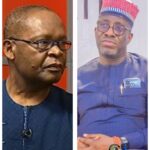Peter Obi Raises the Alarm as Nigeria’s Debt Races Towards ₦200 Trillion by Year-End

Former Labour Party presidential candidate, Peter Obi, has raised concerns over Nigeria’s rising debt profile, cautioning that the nation’s total public debt could exceed ₦200 trillion before the end of 2025. His statement follows the Senate’s recent approval of fresh external and domestic borrowings, which, according to him, will significantly increase the current debt stock without translating into meaningful development for Nigerians.
As reported by the Debt Management Office (DMO), Nigeria’s public debt stood at ₦149.39 trillion in the first quarter of 2025. However, with the National Assembly’s approval of new loans totaling $21 billion, €2.2 billion, ¥15 billion, ₦750.98 billion in domestic bonds, and a €65 million grant, Obi projects that the nation’s debt burden is on track to surge well beyond ₦187 trillion in the short term—and possibly breach ₦200 trillion by December 2025. Obi expressed deep concern over what he described as unsustainable borrowing by the federal government. He noted that while borrowing is not inherently bad, it must be tied to measurable improvements in infrastructure, human capital, and economic productivity. According to him, current borrowing practices are largely consumption-driven, with little or no evidence of corresponding growth or development across critical sectors. He criticized the government for the mismatch between rising debt and deteriorating conditions in the country, pointing out that despite increased security spending—from ₦2.98 trillion in 2023 to ₦4.91 trillion in 2025—the country remains plagued by widespread insecurity. In the past two years alone, he noted, over 10,000 people have been killed, and more than 670 communities destroyed by armed groups. Obi also lamented the deplorable state of national infrastructure and basic services, highlighting that over 135,000 kilometers of roads remain unpaved while national power generation still hovers below 5,000 megawatts, leaving millions without reliable electricity. He further referenced worsening poverty levels, stating that about 133 million Nigerians—over 63 percent of the population—are living in multidimensional poverty, while child malnutrition continues to rise, particularly in the northern states. The former governor argued that Nigeria’s recent GDP rebasing, which places the country’s GDP at ₦372.8 trillion ($243.7 billion), offers little comfort. He explained that even with the improved debt-to-GDP ratio of about 50.16%, Nigeria’s debt remains historically high and poses serious risks to future generations, especially given the country’s weak revenue base and poor economic productivity. Obi called on the federal government to immediately halt further borrowings, reduce the cost of governance, and focus on eliminating corruption and wasteful spending. He urged a strategic shift toward investing in human capital, education, healthcare, and local manufacturing, warning that continued fiscal indiscipline could result in long-term economic stagnation and deepen the hardship faced by ordinary Nigerians. He concluded by stressing the need for urgent, transparent, and accountable economic reforms, stating that the country’s current trajectory is unsustainable and morally unjustifiable, as it effectively mortgages the future of Nigerian children for present-day political expediency.








